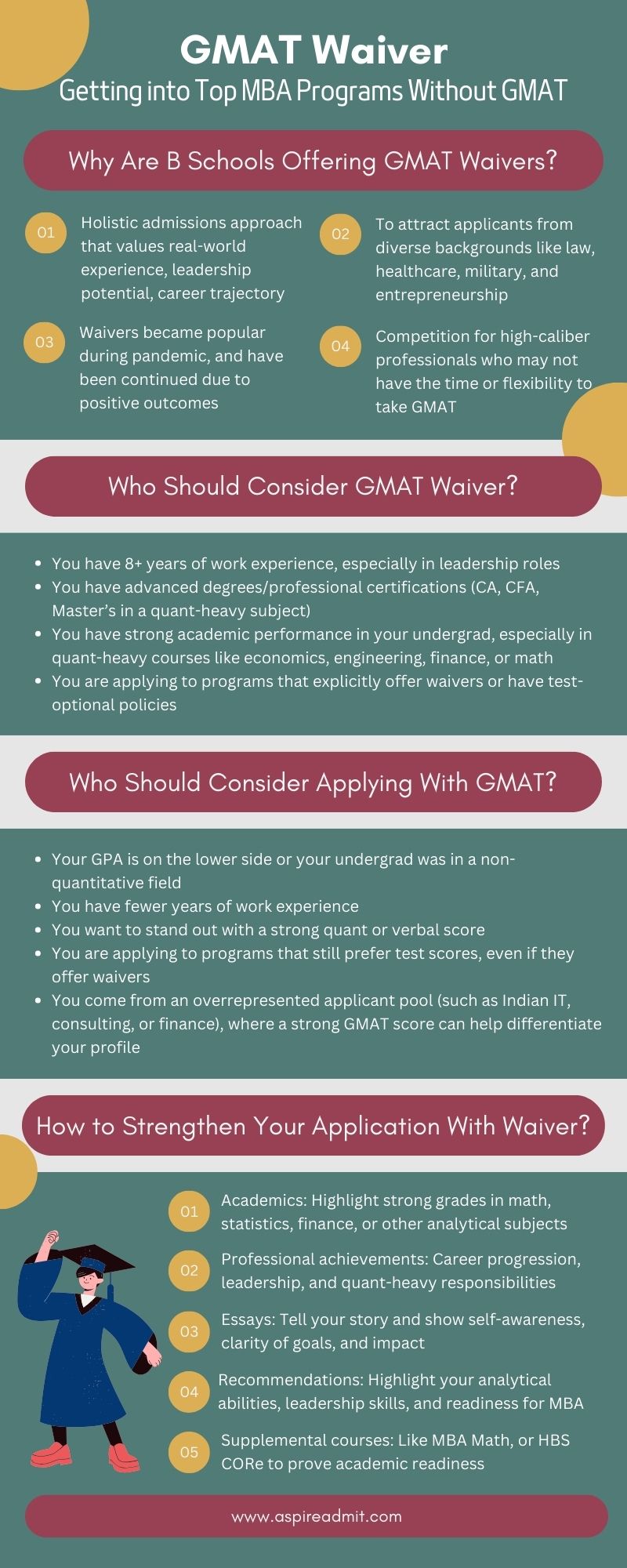GMAT Waiver: Getting into Top MBA Programs Without Giving GMAT
Standardized tests like GMAT and GRE can be the most challenging phase of the MBA application process for many. Spending months on preparation while a working full-time can be demanding, leaving you with little mental bandwidth for the rest of the application journey. Fortunately, many top business schools are offering GMAT waivers—and in some cases, GMAT-optional policies—for qualified candidates. In this post, I am going to discuss about how GMAT waiver works, and whether you can get into a top MBA program without submitting a test score.
Why Are Business Schools Offering GMAT Waivers?
- A more holistic admissions approach: Top programs increasingly value real-world experience, leadership potential, and career trajectory just as much—if not more—than a test score.
- Diversity of backgrounds: Schools are welcoming more applicants from non-traditional backgrounds—law, healthcare, military, entrepreneurship—where standardized testing may not fully capture their potential.
- Pandemic-driven flexibility: The GMAT waiver trend got a major push during the pandemic when access to test centers was limited. But the positive outcomes—more diverse and qualified classes—encouraged many schools to keep the option open.
- Competition for top talent: The truth is that top schools are also competing for top applicants. By relaxing testing requirements, they hope to attract high-caliber professionals who might otherwise choose not to apply.
Want to know more about GMAT waivers?
GMAT Waiver vs. GMAT-Optional: What’s the Difference?
- GMAT Waiver means you have to request a formal exemption from submitting a GMAT/GRE score. Schools will evaluate your academic and professional profile to decide if they can waive the requirement.
- GMAT-Optional means you can choose whether or not to submit a test score. There’s no separate waiver process—you simply apply without it. However, the expectation is that if your profile needs a little academic reinforcement, a good GMAT score could help.
Make sure to check the admissions pages of your target schools to confirm their current policy, as each school defines and implements GMAT waivers or test-optional policies differently—some require a formal request while others let you apply without any additional steps.
Which Top MBA Programs Offer GMAT Waivers?
Some well-known programs offering waivers or test-optional policies:
- MIT Sloan Fellows MBA
- Kellogg Executive MBA (EMBA)
- NYU Stern
- Michigan Ross
- UNC Kenan-Flagler
- Indiana Kelley
- Georgia Tech Scheller
- USC Marshall
Who Should Consider GMAT Waiver?
You might be a strong candidate for a waiver if:
- You have 8+ years of work experience, especially in leadership roles.
- You have earned advanced degrees/professional certifications (e.g., CA, CFA, Master’s in a quant-heavy subject).
- You have strong academic performance in your undergrad, especially in quant-heavy courses like economics, engineering, finance, or math.
- You are applying to programs that explicitly offer waivers or have test-optional policies.
Get your profile evaluated
Is It Really a Good Idea to Skip the GMAT?
That depends on your overall profile.
Skipping the GMAT could help when:
- You are a seasoned professional with a stellar career track record.
- You have already proven academic and analytical ability through work or prior studies.
- The test is a major barrier (time, stress, cost) and not reflective of your potential.
- Your target schools actively promote test waivers or optional policies.
But submitting a GMAT might actually help you if:
- Your GPA is on the lower side or your undergrad was in a non-quantitative field.
- You have fewer years of work experience.
- You want to stand out with a strong quant or verbal score.
- You are applying to programs that still prefer test scores, even if they offer waivers.
- You come from an overrepresented applicant pool (such as Indian IT, consulting, or finance), where a strong GMAT score can help differentiate your profile.
If the rest of your application is a strong indicator of your academic rigor and leadership potential, you may not need a test score. However, if you are not confident of standing out from your competition, a good GMAT score can be a valuable asset.
How to Strengthen Your Application Without a GMAT Score?
If you are applying with a waiver, make sure the rest of your application is perfect:
- Academics: Highlight strong grades in math, statistics, finance, or other analytical subjects.
- Professional achievements: Show career progression, leadership, and quant-heavy responsibilities (like budgeting, forecasting, analytics).
- Essays: Be intentional and reflective. Use this space to tell your story and show self-awareness, clarity of goals, and impact.
- Recommendations: Your recommenders should vouch for your analytical abilities, leadership skills, and readiness for business school.
- Supplemental courses: You could also take an online quant course (e.g., MBA Math, HBS CORe, Coursera’s Business Foundations) to further prove academic readiness.

While it is possible to get into a top MBA program without giving the GMAT, it should be considered as an exception and not the norm. Adcoms still want evidence of academic readiness, leadership, and motivation. The GMAT waiver simply means they are open to seeing that potential in other ways.
If you are not sure whether you should apply with or without the test, consider your goals, strengths, and target programs. Factor in the time and mental bandwidth needed to ace the test, and whether the test score truly represents your potential. Ultimately, the goal is to send in a standout application that tells a compelling, confident, and credible story.
